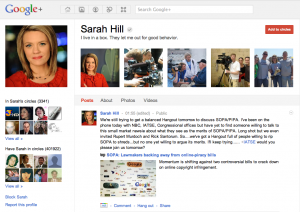What Twitter vs Google+ means for TV
By Jonathan Webdale
18-01-2012
A war of words erupted between Twitter and Google last week when the latter started integrating results from its Google+ social network into its core web search results.
The new service, dubbed “Search, plus Your World,” provoked outrage among many netizens, not least those over at Twitter, who said they were “concerned” at the development and warned that it could mean people no longer get the most relevant results in Google searches.
Some, such as ex-TechCrunch journalist MG Siegler, were quick to label the move anti-competitive.
Google responded, via Google+, saying it was “surprised” at the outcry given the fact that it was Twitter that chose not to renew a commercial agreement last summer that ensured Twitter updates appeared in Google search results.
One of Siegler’s former TechCrunch colleagues argued that Google was indeed well within its rights and was merely doing what was in its nature – sucking up the data available to it, albeit giving itself a foot up the social network ladder it was late to step on to in the process.
Whether you think this latest development is no more than A Google+ Tempest In A Teacup or take the opposite view, you may well be asking what does any of this have to do with TV?
It’s a fair question and the answer is very little right now, but in case it had somehow passed you by, the distinction between the internet and television is rapidly disappearing. As Hulu CEO Jason Kilar put it in his latest blog post revealing a 60% rise in revenue at the US online video provider: “Digital ultimately becomes the primary way that consumers across the globe choose to access content.”
Leaving aside the fact that Hulu’s celebrated figures were below expectations, let’s not deny the company its “conviction” about digital. If there was one thing that stood out from the Consumer Electronics Show (CES) last week it was the fact that the internet and television are becoming one.
True, it’s a theme that has been a constant for several years now, but while Apple TV was apparently the elephant in the room at the Las Vegas confab, there was plenty of talk about Google TV as well. Admittedly perhaps more talk than action, but you get the idea. Google will at some stage find a way to integrate its search technology with TV so viewers can use it to choose what they watch.
Despite all the detractors, the company is far more likely than Twitter to achieve something substantial in this category, although being able to shout out one’s 140-character thoughts about what you’re watching has the immediate advantage of simplicity. As far as the living room is concerned, Google will at some point deliver a kick ass 21st century version of today’s oh-so-quaint ‘electronic programme guides’ (even the phrase sounds dated – a bit like saying ‘stereophonic phonograph’).
Google will be built into the architecture of television, and so too will Facebook, and in this context what the company does now in search will have far-reaching consequences down the line for the way in which we discover programmes.
Through Google+, Google Hangouts is already emerging as a serious broadcast medium for some. While the most immediate application is for those increasingly patronised by the phrase ‘citizen journalist,’ the possibilities are only just being realised, particularly when the power of YouTube is factored in.
But, of course, many of these things are entirely dependent upon Google being able to build up its Google+ user base, hence the introduction of Search, plus Your World.
Events like this Thursday’s Google interview with +David Beckham and subsequent hangout will no doubt help. Lady Gaga has just joined as well.
You can see why Twitter’s getting twitchy. Google+ is beginning to look like a serious social network contender, particularly as it begins to add new features like hashtags.
Whether the latest move is deemed anti-competitive remains a question for regulators.
But amid all this talk of the world’s dominant search engine and its unrelenting progress towards global domination, it’s worth putting things in context. Returning to CES, Panasonic surprised many with its finale: a connected TV partnership with none other than MySpace.
While the announcement apparently prompted laughter in the audience, don’t write off MySpace just yet. The one-time market-leading social network is, according to ComScore, bigger than Google+ and Tumblr.















.jpg)




























